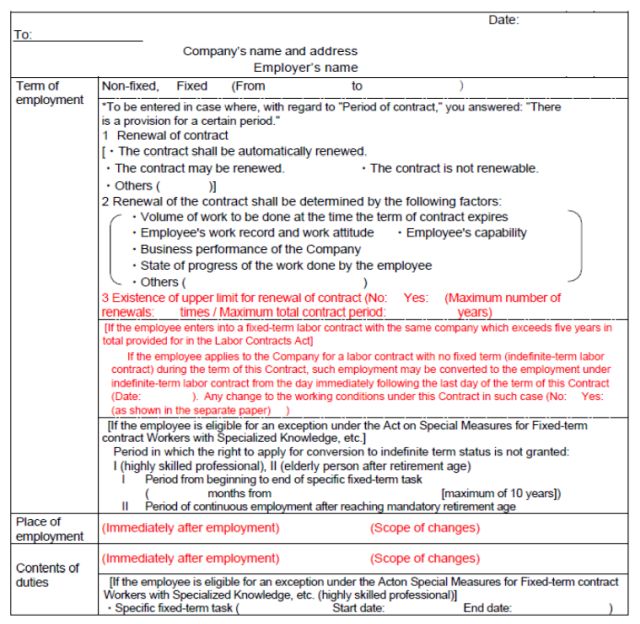On March 30, 2023, the "Ministerial Ordinance Partially Amending the Ordinance for Enforcement of the Labor Standards Act (the " Ordinance") and the Act on Special Measures for Improvement of Working Hours Arrangements" (Order of the Ministry of Health, Labor and Welfare No. 39 of 2023) were issued and announced to amend the Labor Standards Ordinance, etc. (the "Amended Ministerial Ordinance" or the "Amendment"). As a result of this Amendment, from April 1, 2024, matters concerning terms and conditions of employment to be notified by employers to employees when concluding and renewing an employment contract will be added to the regulatory framework. After explaining basic matters concerning the obligation to notify the terms and conditions of employment, the amendments will be described later.
I. Obligation to Explicitly Indicate Terms and Conditions of Employment
Employers must explicitly indicate wages, working hours, and certain other terms and conditions of employment to employees when entering into an employment contract (Article 15, Paragraph 1 of the Labor Standards Act (the "LSA")).
In addition, the Ordinance stipulates that employers must not make any inaccurate representations regarding the content of the terms and conditions of employment (Article 5, Paragraph 2 of the Ordinance). If any terms and conditions indicated to the employee differ from the facts, the employee may immediately cancel the employment contract (Article 15, Paragraph 2 of the LSA).
II. Timing of Explicit Indication
Employers are required to explicitly indicate the nature of the terms and conditions of employment "when entering into an employment contract". The wording, "when entering into an employment contract" as used in this context includes the renewal of an employment contract with a fixed term ("Fixed-Term Employment Contract") after the expiration of the original contract term, and also includes re-employment after reaching an employee's mandatory retirement age. Therefore, in the case of a Fixed-Term Employment Contract, it should be noted that terms and conditions of employment must be explicitly indicated not only when entering into an employment contract, but also when the contract is renewed.
III. Terms and Conditions of Employment that Must Be Explicitly Indicated
As a result of this Amendment, new matters requiring an explicit drawing of attention were added by way of Article 5 of the Ordinance. As shown in the table below, newly added matters that must be explicitly indicated can be classified into those applicable to all employees, and those applicable to employees with a Fixed-Term Employment Contract (fixed-term employees).
| Subjects to whom explicit indication of terms and conditions of employment applies | Newly added matters that must be explicitly indicated |
| All employees |
|
| Fixed-term employees |
|
(1) Matters To Be Explicitly Indicated Applicable to All
Employees
Prior to the Amendment, the Ordinance only required employers to explicitly indicate "matters concerning the place of work and the contents of duties", more precisely, the place and contents of work immediately after employment. In this Amendment, however, the wording "(including the scope of changes in the place of employment and the contents of duties)" was added from the viewpoint of improving employment predictability for employees (Article 5, Paragraph 1, Item 1- 3 of the Amended Ordinance). As a result, employers are required to explicitly indicate the scope of changes in the place and contents of work after employment on or after April 1, 2024. Specifically, the "scope of changes" refers to the scope of the place of work and its contents as these may change due to future reassignments, etc.. In this regard, the Ministry of Health, Labour and Welfare has published the following notice of terms and conditions of employment as a sample.

(Source: the website of the MHLW)
With regard to the specific details of the description, the MHLW has already released a detailed brochure (available only in Japanese)1. Each company needs to consider how to describe the terms and conditions of employment reflecting the context of the examples provided in this brocure.
(2) Matters To Be Explicitly Indicated Applicable to Fixed-term Employees2
(i) Explicit Indication of the Maximum Limit for Renewal of Contract
In practice, in order to avoid a long contract period for fixed-term employees, some employers set an upper limit for the contract period or a maximum number of possible renewals (the "Limit for Renewal") for Fixed-Term Employment Contracts. It is understood that setting such a Limit for Renewal is not illegal per se. However, if the contract is unclear as to whether there is such a Limit for Renewal, employees will likely expect that they will be able to renew the contract or to convert the contract to an indefinite-term employment contract, and if this does not match the expectations of the employer, friction between the parties may ensue.
In light of this, the existence and contents of the Limit for Renewal have been added as matters that must be explicitly indicated to the employees by employers at the time of conclusion of a Fixed-Term Employment Contract (Article 5, Paragraph 1, Item 1-2 of the Amended Ordinance) (please refer to the Ministry sample shown above).
It should be noted that even if an employer establishes a Limit for Renewal in accordance with the Amendment, it does not necessarily guarantee , upon reaching the stipulated Limit for Renewal, that the reasonable expectations of the employee for a renewal of contract will necessarily be extinguished and termination of employment will be allowed as a matter of course.
(ii) Obligation to Explain in Case of Establishment or Lowering of the Limit for Renewal
In practice, some employers present an employment contract that sets a Limit for Renewal to an employee at the time of renewal of a contract and request the employee's consent thereto. It has been pointed out that setting a new Limit for Renewal after the conclusion of the initial contract is likely to cause a dispute between parties since it disadvantages employees who have an expectation of renewal at that point.
From the viewpoint of preventing any disputes caused by the setting a Limit of Renewal, the "Standards for Conclusion, Renewal and Termination of Fixed-Term Employment Contracts" were also amended (Notification of the Ministry of Health, Labor and Welfare No. 114 of March 30, 2023) following the Amendment, which stipulates that an employer, when taking the following measures, must explain in advance to an employee the reasons for taking the measures (Article 1):
- When establishing a new Limit for Renewal after the conclusion of the initial employment contract
- When attempting to lower the Limit for Renewal established at the time of the conclusion of the initial contract
In addition, Japanese courts carefully consider whether consent was indeed freely given by an
employee due to the concern that, if a Limit for Renewal is set at the time of renewal of an employment contract, the employee may fear that a refusal to provide consent may result in termination (i.e., non-renewal) of their employment contract.
IV. Penalty for Violation of the Obligation to Explicitly Indicate Terms and Conditions of Employment
In the case of violation of the obligation to explicitly indicate the terms and conditions of employment mentioned above, any employer and any person who commits such an illegal act may be fined up to JPY 300,000 (Article 120, Item 1 and Article 121 of the LSA).
V. Date of Enforcement
This Amendment will come into effect on April 1, 2024 (Article 1 of the Supplementary Provisions of the Amended Ministerial Ordinance).
Footnotes
1. https://www.mhlw.go.jp/stf/newpage_32105.html
2. We plan to provide a separate explanation on the explicit indication of matters related to conversion to an indefinite-term labor contract.
The content of this article is intended to provide a general guide to the subject matter. Specialist advice should be sought about your specific circumstances.


